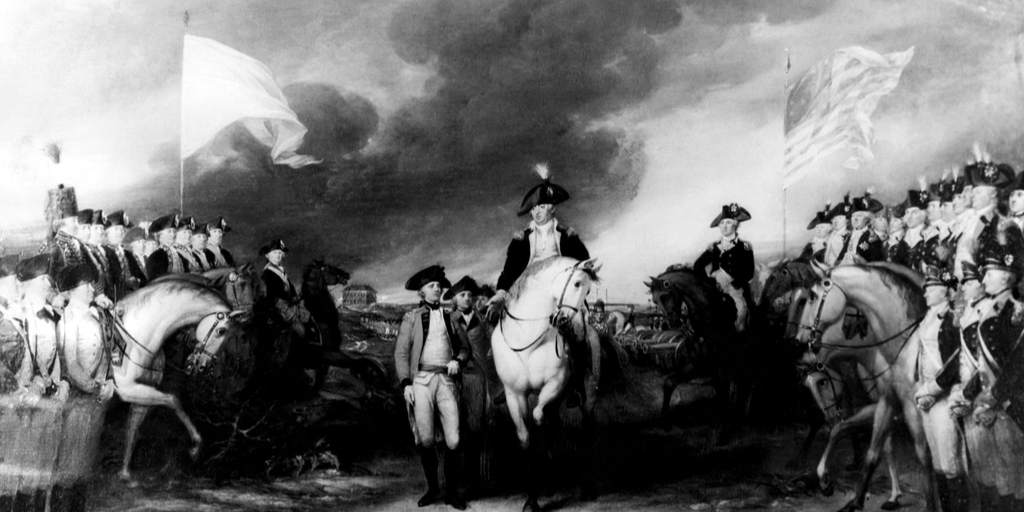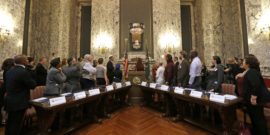A Reflexive and Reactive George Washington?
A patient search through this Washington biography that focuses on the military phase of his career reveals a George Washington who achieved monumental fame almost inadvertently. One encounters in the quest a man who was shaped by his environs even as he possessed extraordinary talents to influence and shape those around him. Author Robert L. O’Connell was doubtless tempted to embrace the term “generalissimo,” which Elbridge Gerry used in describing the great Virginian. For O’Connell certainly identifies in Washington the command presence and perseverance of a generalissimo. However, that presence and perseverance were expressed, he writes, through cunning and manipulation “in the cause of rectitude and moderation.”
Yet when one seeks for the explanation or source of the rectitude (should we say “righteousness”?), one finds only a halting, spasmodic development of commitment to fundamental moral principles that result mainly from either the “hard knocks” of experience or the influence of sympathetic but dogmatic minds around Washington. In other words, O’Connell, a veteran of the U.S. intelligence community and visiting professor of history at the Naval Postgraduate School, fails to provide a coherent, developmental account of George Washington that reveals him as “his own man” in any sense other than an inherited status as gentry.
This result greatly surprises the reader, because Revolutionary: George Washington at War performs a superb service in highlighting the dramatic moments that express Washington’s character and illustrate his judgment.
To take a few examples:
He shows as few others have done the patient and deliberate steps that led to Yorktown in such a manner as to provide strong support for Washington’s postwar claim to Noah Webster—that such had been his intention for a long while, and that the posture of moving on New York was a feint.
Similarly, he shows the numerous preparations that Washington took prior to the Second Continental Congress to prepare for service in war (including offering to fund and train a company of militia on his own, thus rendering rather silly the oft-repeated apothegm that he sought command by dressing up in his military regalia for the actual sitting of the Congress). There was no one at the Congress who had not been cognizant of Washington’s determination to urge the “last resort.”
Indeed, O’Connell even uncovers Martha Washington’s indirect confirmation of Washington’s early resolve, when she is reported as saying to Edmund Pendleton and Patrick Henry that she certainly wished they were prepared to stand firm as Washington was. That would mean nothing less than that George and Martha had fully discussed the likelihood (not merely the possibility) of his pending service. The biographer even cites the April 5, 1769 letter to George Mason, in which Washington spoke of taking up arms, though he showed no awareness that Washington did so well in advance of anyone else in the country.
O’Connell identifies Washington’s early appeal to “nationality,” well before the Declaration of Independence or any materially similar appeals, and his correlative defenses in the same context of the people’s sovereignty. And he completely details, as has been often done, Washington’s meticulous cultivation of respect for civilian authority, even in the direst and most tempting circumstances.
There are more examples of a patterned conduct throughout the American Revolution, but the foregoing should suffice to establish that O’Connell commanded lessons sufficient to inform a clear judgment of Washington’s capacities.
It is therefore rather inexplicable that he focuses on a Washington shaped by, rather than shaping, his circumstances. Naturally, no one escapes the inevitable effects of surrounding circumstances conditioning available choices. There remains, however, full scope within such constraints to form one’s choices on the basis of principles rather than mere reflexes.
It may be said in extenuation of O’Connell’s performance that he has written almost entirely a military history, in which case he need not be held strictly liable to provide a comprehensive account of the mind and character of his subject. But that palliation is undermined by his concomitant tendency to wander into such territory as whether George Washington and Sally Fairfax sexually consummated their relationship (for which there is not even good speculative foundation, since even more solidly probable surmises are available).
Similarly, he treats Washington as essentially insensitive to the moral character of slavery until coming under the influence of Alexander Hamilton, John Laurens, and the Marquis de Lafayette. He entertains that speculation even after taking note of Washington’s description of slavery as “tyranny” long before he met any of those three abolitionists. He notes the power of Washington’s sense of the force of conscience—citing the 110th of the teenaged Washington’s famous rules of civility (“Keep alive in your breast that little spark of celestial fire called conscience”)—but seeks no solid foundation for it.
Perhaps nothing so distinctly conveys the blind-folded manner in which O’Connell treats his subject as his use of the rather facile “Country Party” ideology as the source for Washington’s commitment to the revolutionary cause. This means that historical forces, an evolving social consciousness and not deliberate choices, lay at the root of the Revolution and the particular decisions of individuals.
It is not necessary or correct to discount the movement of ideas in society in order to identify the power of emulation to move human beings in one direction or the other. When George Washington declared to the Reformed German Congregation in 1783 that “civil and religious liberty” were what motivated him to take the field, that need not be regarded as a mere ex post facto rationalization. And it is certainly not compatible with the simplistic explanations of the Revolution upon which O’Connell depends. For it is singular that, after all the protests of constitutional excesses that dominated the pre-war discourse leading to the Revolution, at no point was the issue of religious liberty raised (other than tangent to the Quebec question), and the phrase “the rights of Englishmen” was never parsed as the principle of civil liberty.
In short, the breadth of Washington’s declaration cannot be explained away with reference to “psychological” dispositions cultivated over the course of a generation.
Revolutionary: George Washington at War, while adhering to the hagiographic tradition in some respects, has the unhappy consequence of making its subject a man at war with himself—a revolutionary with no particularly worthy reason to revolt nor a particular vision or goal to accomplish. That, in the end, may be the reason this is a military history and makes no effort at all to comprehend the subsequent founding labors of George Washington.


